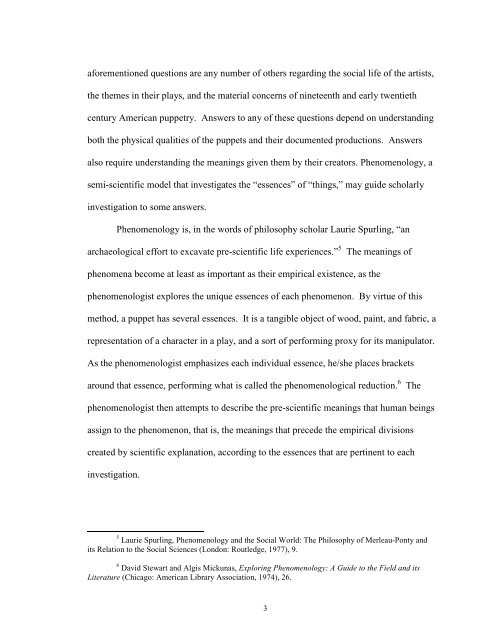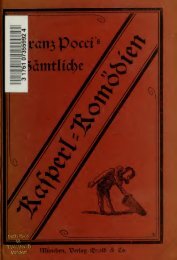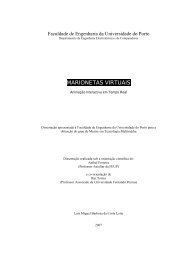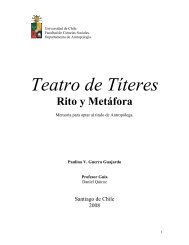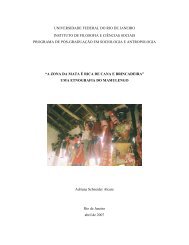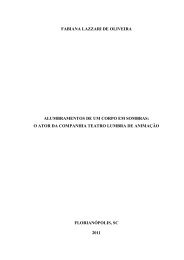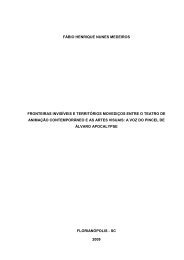- Page 1 and 2: ABSTRACT Title of Dissertation: THE
- Page 3 and 4: THE PHENOMENOLOGY OF RACIALISM: BLA
- Page 5 and 6: Dedication This dissertation is ded
- Page 7 and 8: Table of Contents Dedication.......
- Page 9: House and the Brooklyn Academy of M
- Page 13 and 14: previous related performances, are
- Page 15 and 16: “blackface” as counterfeit perf
- Page 17 and 18: demands of this transcendent notion
- Page 19 and 20: To manage such an investigation, th
- Page 21 and 22: a celebration of superiority. 20 Th
- Page 23 and 24: playbill, minstrel show script, con
- Page 25 and 26: Lano fancies himself an advocate of
- Page 27 and 28: of the African American race, and s
- Page 29 and 30: in creating the first connection be
- Page 31 and 32: In order to explain the interaction
- Page 33 and 34: performance. 29 Marionette minstrel
- Page 35 and 36: Nonetheless, it maintains the criss
- Page 37 and 38: 3), into more complex types. By the
- Page 39 and 40: from the head and leg strings, can
- Page 41 and 42: leased Queen’s Hall in Liverpool
- Page 43 and 44: effectively capture the nonlinear p
- Page 45 and 46: other puppet, is not slack and seem
- Page 47 and 48: was already showing considerable ar
- Page 49 and 50: The Marionettes in Performance The
- Page 51 and 52: of an aged former slave who has esc
- Page 53 and 54: The criminal acts and dishonesty de
- Page 55 and 56: Antislavery songs in a marionette p
- Page 57 and 58: e useful to compare the joke exchan
- Page 59 and 60: the figure, once “folded up prepa
- Page 61 and 62:
eginning with a wide variety of mar
- Page 63 and 64:
Christy Minstrels, with their reper
- Page 65 and 66:
Walter E. Deaves Edwin Deaves, Walt
- Page 67 and 68:
some images of minstrel players (re
- Page 69 and 70:
Yet, one cannot easily reduce the s
- Page 71 and 72:
Daniel Meader Sometime after 1874,
- Page 73 and 74:
lackface makeup, rather than authen
- Page 75 and 76:
figure 12. His hair is slightly hig
- Page 77 and 78:
puppets for the last time, he may s
- Page 79 and 80:
The Meader Uncle Tom suggests the e
- Page 81 and 82:
Chapter III: David Lano The Essence
- Page 83 and 84:
lackface characters for ridicule; h
- Page 85 and 86:
doctor. Lano then depicts the black
- Page 87 and 88:
A colored quartet now sang. They we
- Page 89 and 90:
The Career of David Lano While thre
- Page 91 and 92:
Lano’s solo career. One of the la
- Page 93 and 94:
human oddities. Like many of its ki
- Page 95 and 96:
“continually transforms necessity
- Page 97 and 98:
David Lano’s Work Lano’s extant
- Page 99 and 100:
such as the kakunga of the Suku peo
- Page 101 and 102:
The clothes are a curious blend of
- Page 103 and 104:
the age of ten, he presented his ow
- Page 105 and 106:
Punch murdering the Servant. Lano c
- Page 107 and 108:
form by introducing sentimental mus
- Page 109 and 110:
creation on the basis of active mot
- Page 111 and 112:
divided between the “Sambo” and
- Page 113 and 114:
Though they share in the appercepti
- Page 115 and 116:
mild embarrassment on his use of Ji
- Page 117 and 118:
“The marionette can be anything o
- Page 119 and 120:
he [can] find them.” 147 Calthrop
- Page 121 and 122:
of the Moor, who is, though still m
- Page 123 and 124:
slanted and sharp, the nostrils are
- Page 125 and 126:
perhaps the beginning puppeteer, wh
- Page 127 and 128:
taken it from playwright Tsou Ku Ch
- Page 129 and 130:
figure, who dismisses his complaint
- Page 131 and 132:
Thus, the structure of the play pre
- Page 133 and 134:
Chapter V: The Majors The major pup
- Page 135 and 136:
Bedchamber.” 165 Sarg described:
- Page 137 and 138:
Critics and fellow puppeteers prais
- Page 139 and 140:
Sarg and Blackface Though Sarg neve
- Page 141 and 142:
“Skin me, Brer Fox,” sez Brer R
- Page 143 and 144:
possibilities of puppetry led him t
- Page 145 and 146:
was common with the so-called “To
- Page 147 and 148:
present his particular imaginations
- Page 149 and 150:
herself in need of independent econ
- Page 151 and 152:
The Essence of Puppetry for Sue Has
- Page 153 and 154:
the head to the right and left, to
- Page 155 and 156:
art,” and “a descendent of the
- Page 157 and 158:
puppeteers to avoid complicated and
- Page 159 and 160:
delicate verisimilitude for blackfa
- Page 161 and 162:
Remo Bufano: The Local Emcees the E
- Page 163 and 164:
Club’s stage (ca 1932) began with
- Page 165 and 166:
world culture, including a Medieval
- Page 167 and 168:
impressive aspects of elaborate, la
- Page 169 and 170:
capture the great variety of black
- Page 171 and 172:
tangled a Prime Minister marionette
- Page 173 and 174:
program continued with a pair of ne
- Page 175 and 176:
no good messin’ aroun’ wid whit
- Page 177 and 178:
By inaugurating the action with thi
- Page 179 and 180:
lackface stereotypes, but also mark
- Page 181 and 182:
Brown’s puppetry work is enigmati
- Page 183 and 184:
(Marionette Minstrel Show), and Bru
- Page 185 and 186:
and personality for her/his creatio
- Page 187 and 188:
Paris’s semiotic choices introduc
- Page 189 and 190:
characters were common to the varie
- Page 191 and 192:
However, the essential realism of t
- Page 193 and 194:
A ninth grade Art Club in Oshkosh,
- Page 195 and 196:
the Royal Marionettes, with some re
- Page 197 and 198:
slips away with his clothes. The ti
- Page 199 and 200:
the same moment, Mumbo commented on
- Page 201 and 202:
Munger also introduced a range of a
- Page 203 and 204:
minstrelsy. They would also permit
- Page 205 and 206:
yo all arrested.” 249 In the same
- Page 207 and 208:
exclamation; “Oh, my lan’! Now
- Page 209 and 210:
Tom. Simon Legree was a puppet base
- Page 211 and 212:
event led to a full season of produ
- Page 213 and 214:
comic context of their puppet plays
- Page 215 and 216:
epresentations of blacks would cont
- Page 217 and 218:
impressive, and touted his enterpri
- Page 219 and 220:
clearly believes that some other pu
- Page 221 and 222:
of the play to connect with African
- Page 223 and 224:
its length (see figure 52). Finally
- Page 225 and 226:
O’Neill’s take on Henri Christo
- Page 227 and 228:
audiences, then goes on to suggest
- Page 229 and 230:
Chesse’s reading of Brutus was th
- Page 231 and 232:
meticulous artistic strokes then, c
- Page 233 and 234:
Many of the lost objects may have b
- Page 235 and 236:
sketches would be well-served by th
- Page 237 and 238:
The FTP production of Little Black
- Page 239 and 240:
transmitted to, and circulated with
- Page 241 and 242:
Conclusion: Phenomenology, Authenti
- Page 243 and 244:
the essence of less grotesque black
- Page 245 and 246:
used them in plays where puppets ce
- Page 247 and 248:
minstrelsy-derived Topsy, as genuin
- Page 249 and 250:
productions featuring blackface cha
- Page 251 and 252:
_. Race and Ethnic Relations. 3 rd
- Page 253 and 254:
Durham, Weldon B. ed. American Thea
- Page 255 and 256:
Hill, Errol. Shakespeare in Sable:
- Page 257 and 258:
Mahar, William J. Behind the Burnt
- Page 259 and 260:
Powell, Herbert Preston. The World'
- Page 261 and 262:
Spurling, Laurie. Phenomenology and


